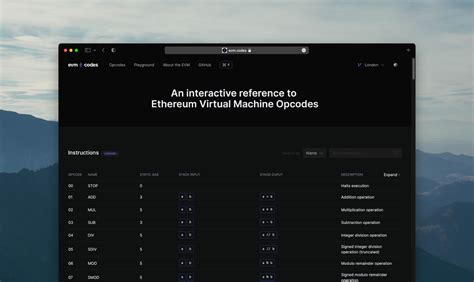Ethereum: Understanding the fees for an OPCOD and their effects on the gas costs
In Ethereum, the total price based on a specific indicator is calculated when executing a contract function, which is known as an OPCODE fees. These fees are also referred to as gas fees and are determined by the implementation of individual operations (opcodes) within the contract.
What are Opkodi?
OPCODES are the instructions that make up the virtual Ethereum machine. You determine which measures are taken within a contract. There are a total of 256 possible options, each of which is a specific action or operation.
How do you calculate the fees for opcodi
The costs for OPCOD gas are calculated by adding up the costs of all individual operations within the contract that lead to implementation. In other words, if several opcodes are carried out consistently to achieve the desired result, your cumulative price is higher than if only an OPCOD is used.
Example: calculation of gas costs
Let’s look at an example in which we have three options:
Call: This opcode calls a different contract or another function and transmits arguments.
Store: This opcode stores data in the memory.
Sub: This opcode removes a value from the top of the stack.
In order to calculate the gas price for this example, we assume:
- Opcode
Callcost 30 ether for implementation (this is an arbitrary example and the actual costs can vary).
- Opcode
Storecosts 500 Ether for the execution.
- Opcode
Subcosts 20 ether for the implementation.
If we meet the contract in the following sequence:
- Call another contract with
callopcode: 30 ether
- Save data with the
Store: 500 ether
- Remove a value from the top of the stack with the
Sub: 20 Ether
The total price for gas is 30 + 500 + 20 = 570 ether.
Effects on gas costs

As you can see, the implementation of several opcodes leads to higher costs than after their execution one after the other. This is due to the fact that each opcode has its own set of variables that have to be loaded to stacks or memory before they can be executed.
In the real scenario, developers often use techniques such as gas and cache optimization to minimize the number of fillings of the op code, which reduces the total price.
Diploma
Understanding the opto fees is crucial for the development and implementation of contracts based in Ethereum. By calculating the gas costs for individual opcodes, developers can ensure that their contracts for implementation and profitability are optimized. While the Ethereum ecosystem is developing, it is important to be up to date with the latest best practices and techniques for the management of opcodes.


